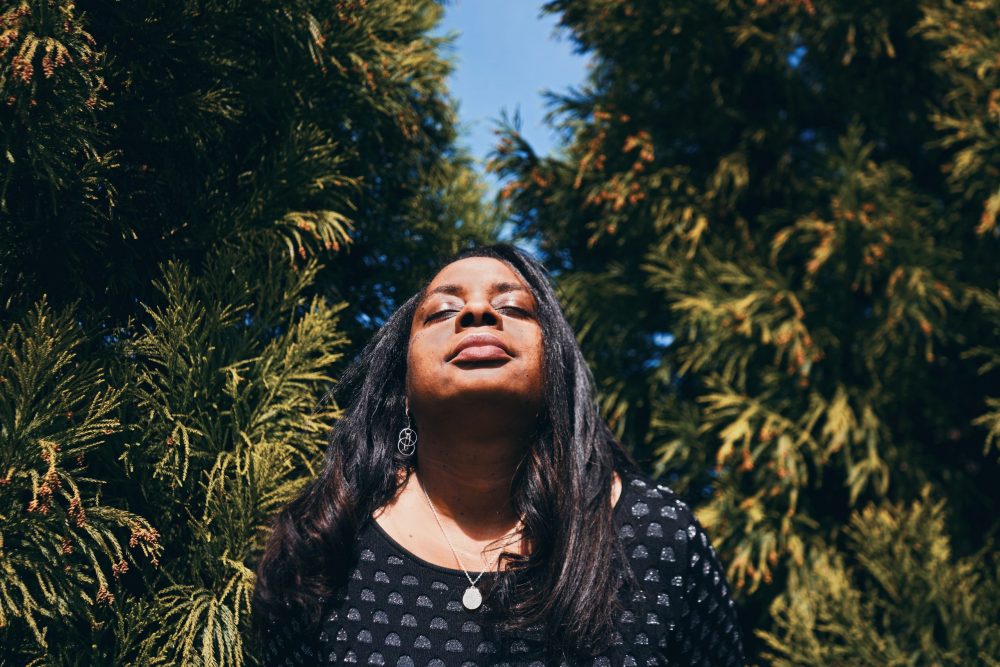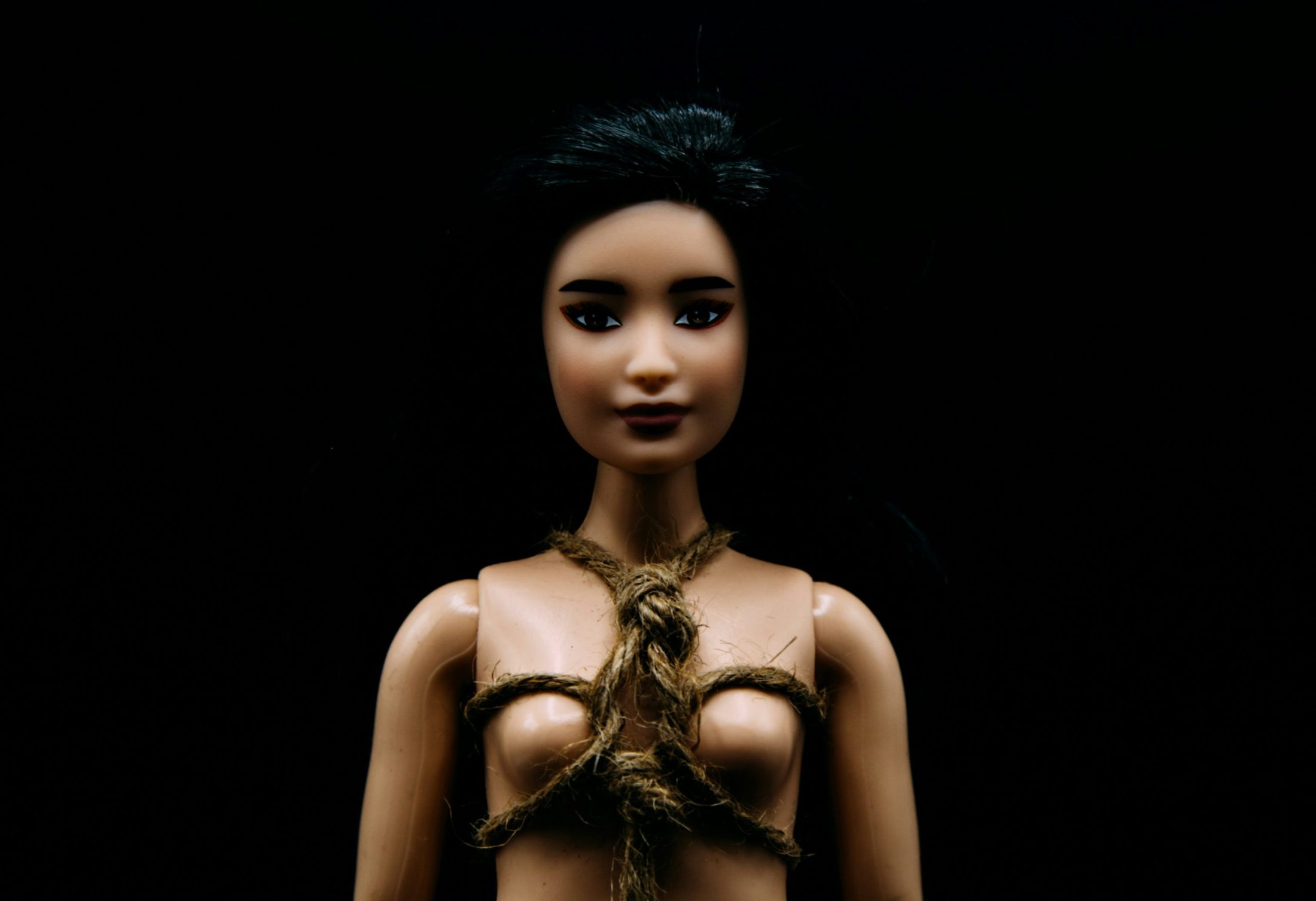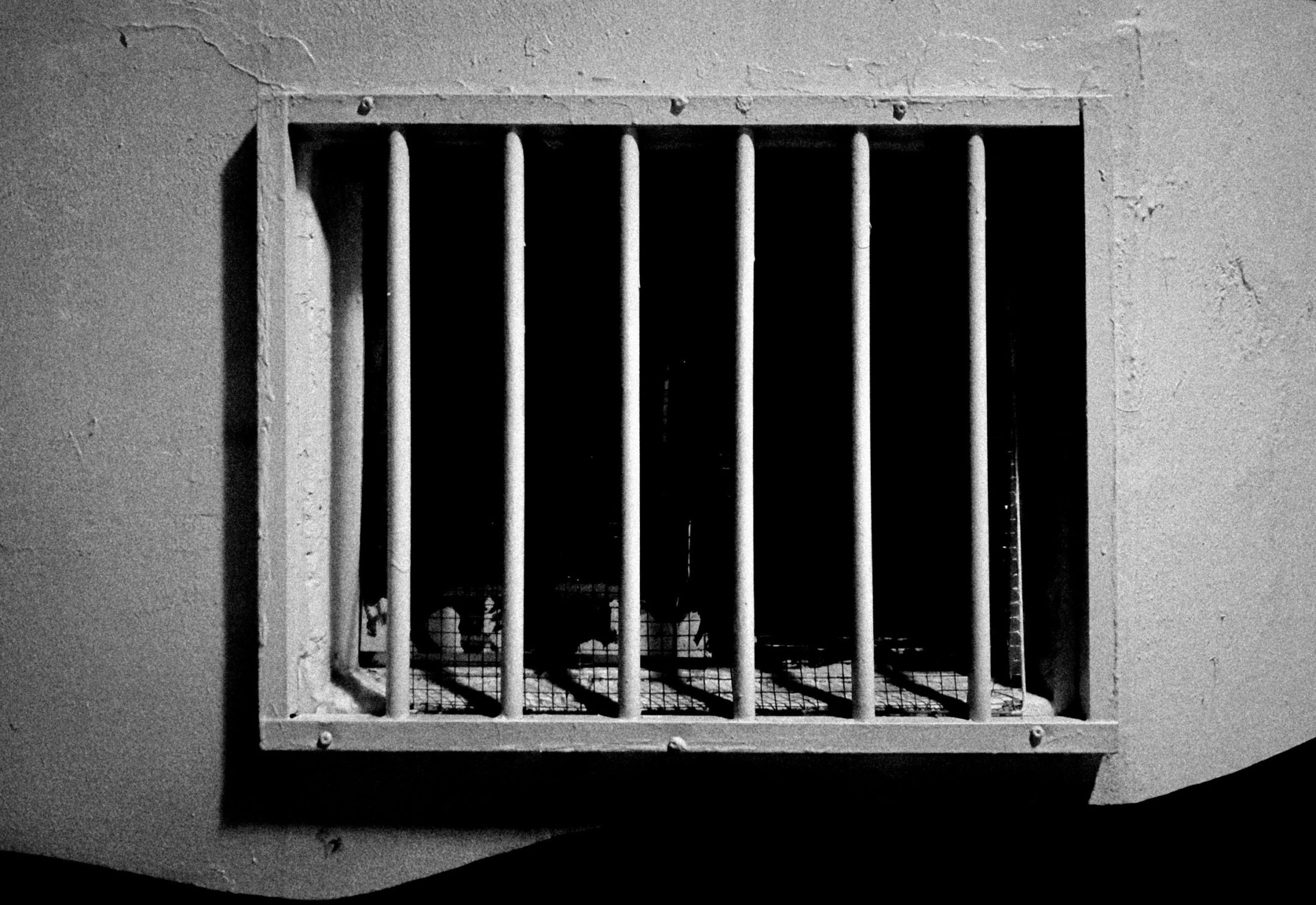interviews
A Radical Poetic Manifesto About Queer Liberation
Andrea Abi-Karam, author of the collection "Villainy," on queer public sex as an act of rebellion against state surveillance

Andrea Abi-Karam’s second poetry collection, Villainy, rises out of their grief in response to the 2016 Ghost Ship warehouse fire, which claimed 36 lives in Oakland, and the 2017 Muslim Ban that banned refugee and immigrant entry into the United States from certain majority Muslim countries. Abi-Karam interrogates the precarity of the queer body in the American imaginary, the possibilities of queer desire to combat grief, the trans Arab American body as an artefact, and the intersection of queer joy and precarious living.
In this anarchist poetic manifesto, the theme of survival in the face of surveillance coexists with queer desire and joy in public places. Queer sex in public—like a dance floor, a museum room, etc.—in particular, becomes a way to articulate rebellion in the face of state surveillance. Abi-Karam’s work is specifically interested in the healing and empowering nature of collective work and co-existence, whether that’s in their personal politics or creation of art.
Abi-Karam and I spoke on video chat, and discussed reclaiming the trans queer body through poetry, as well as connections between their work and real-world dilemmas within America.
Sanchari Sur: The overarching theme seems to be the process of questioning archives, both national as well as personal, and how the trans Arab American body exists within and outside those narratives. Can you speak to this overarching theme?
A huge part of this desire around public sex and public protests are overlapping; this need to be ‘I’m a queer freak, deal with it’ while grappling with the fact that it’s dangerous to be visible in these ways.
Andrea Abi-Karam: I’m interested in your interpretation of the book as one of questioning archives, because something that I’ve thought and written a lot about is wanting things to exist in the present like queer cruising, temporary autonomous zones and I think “archive” is a loaded concept. But I was inspired a lot by the works of Ana Mendieta and David Wojnarowicz as people who died really young—because of the patriarchy, the state, queer erasure, brown erasure—and wanting to re-enliven them, and think about what it would be like to be in community with them, and make art, performance, and write alongside them. So I was trying to bring them into the present. I wanted to be in conversation with them, and simultaneously think about my own grief that I’ve experienced both on a micro and macro scale.
SS: In your opening pages, you write about sex, both as unbecoming as well as a reclamation of the queer body. I’m interested in the specificity of that fleeting moment of being perceived as the other while having public sex. I’m thinking of that scene on the dance floor, where the speaker is with a person who they’re pleasuring in a crowd and this person starts moaning, but then the crowd thinks that this person is going to faint. It’s a cool moment of dissonance, and these kinds of moments keep coming up. Can you speak to how you reconcile sex as unbecoming and reclaim the queer body?
AAK: In my own trying to survive the experience of losing so many friends to the Ghost Ship Fire, one of the main things I turned to was queer sex, and this very desperate desire to feel connected to other people. In these fleeting, revelrous pleasurable moments, the lines were blurred between me and the person that I was with, or us and the larger crowd, and this need to melt into the crowd simultaneously. A huge part of this desire around public sex and public demonstration in protests are overlapping; this need to be “I’m a queer freak, deal with it” in public while simultaneously understanding and grappling with the fact that it’s dangerous to be visible in these ways.
I am working on a poet’s novel project right now, and I was working on a scene this morning where I was taking the BART from Oakland to San Francisco to do a performance, and I had done my makeup before getting on the train. And then, this man was following me from the train through the station, and I was very freaked out and was able to find a cab and hopped in the cab even though the venue was one block away. And I was unpacking this moment. And I was like, “What is it about this moment? Was it the fact that I was being perceived as feminine? Or, was I being perceived as a disgusting freak?” There was both an attraction and disgust coming from this man and a need for him to get me or whatever. That was a moment I was alone in public, displaying my queerness visibly, and what the repercussions of that were. So, a lot of things in the book, in public around work or sex, on the dance floor or at Pride, were kind of enmeshed in queer collectivity and resiliency, and strength and survival, that’s possible when you’re working together. If I in that moment, when I was trying to escape the pursuit of that man, if I had been with a huge crew, it would have been a totally different experience.
SS: Can you speak to that temporary space, that space where there’s both pleasure, as well as being perceived as something else? It comes up when you write about cops kicking the speaker and their friends out from a park, but the group uses the cops’ lights as a stage. It also comes in that space in the museum, where the speaker is having sex with another person, but is interrupted by a guard. I think these moments are extremely empowering slippage.
What do you do between having been permitted space and the moment when that changes?
AAK: Both of those moments are around trying to construct in poetry of what it feels like to be part of a temporary autonomous zone, whether it’s with one other person, or whether it’s with a big group of people. And you’re picking up on an interesting point: What does it mean when there’s the perspective of the state, or the surveillance state? For example, the security guard keeping an eye on the museum, or state security like the police being “it’s cute, you had your little dyke march and now it’s time for you to go.” What do you do with those moments, between having been permitted space, and then the moment when that changes? I am thinking of the power of collectivity, because that was the one weekend a year when queer people are allowed to be hanging out in the street for a couple of days. There’s always the clear block of Pride, which is the most fun part of Pride, but it’s still not enough. It’s a few hours a year when we’re able to take over this type of space in this particular way.
There’s a thing that happens in poetry around self-reflexivity, and it’s not something that I’m that into as a poet in my own work, but having these multiple perspectives and the awareness around the danger of existing as visibly other in these types of spaces that are maybe temporarily controlled by us. “What can we achieve in those temporary moments?” is the question of materiality and imagination that Villainy is working with.
SS: In the first section, “The Aftermath,” the speaker seems to negotiate how poetry or the arts can accurately be a form of militancy, as you write about the “fanonian poem” that would be “fire.” How do you negotiate arts as militancy while living marginally, eking out space that was otherwise withheld?
AAK: To quote Audrey Lorde, “to transform language into action,” and that’s something that I’m constantly thinking about when I’m writing. When I was younger, I used to think that poetry alone could affect some sort of change. And now I have a much more complicated and nuanced perspective which is that militant, radical poetry arises alongside social movements. And so, there’s some sort of participation happening by the writer, whether it’s the potluck, the protest, the meeting, whatever, there is some sort of direct participation happening in contributing towards uprising, which is where militant poetry arises from, intertwined like a helix.
SS: Singularity as a theme exists throughout your work. I’m really interested in what it means to embody or try to live or articulate a truth outside the hegemony of singularity.
Militant, radical poetry arises alongside social movements.
AAK: I’m talking about “whatever singularity,” a phrase I lifted from Tiqqun, a French-Italian radical collective. They’re a group of French authors and activists. So, this phrase means a subversion of the idea of singularity. And I’m thinking about singularity as singleness. The type of poetry that’s written in the lyric I register that’s only referring to the author, or the projected identity of the author in the work. And the unravelling of ‘whatever singularity’ is fracturing of the idea that there is a single self that can be disconnected, can exist in a vacuum, can be disconnected from community. It’s one of those phrases that’s become meaningless at this point where this person is a “singular” artist. It’s like they have made something new and they’ve done it all on their own and they didn’t have friendships or collaborators. So, I’m breaking down these two things simultaneously that art or writing can exist detached from its social and political moment; one wanting to slide from singular to collective as a form of empowerment.
SS: So, this idea of articulating a truth outside the hegemony of a singularity; is this what it means to be a villain for you?
AAK: One of the many things of being a villain means being some sort of threat to the state, the status quo, US nationalism, US military, rising new fascism, white supremacy. And I have thought a lot about what it means to be a queer villain in public, and how aggressive queerness is both empowering, but also quite dangerous. And what does visibility mean during a hyper surveillance state—like we are living in today—where if you do something temporarily that provides a collective moment of liberation, what is the aftermath of that? Are you on the FBI watch lists? Do all the cops in the city have your photo? I mean, this is how the surveillance state operates, and then begins to chip away at strong groups of activists.
SS: Can you speak to your relationship as a poet to the art of Ana Mendieta as it plays out in Villainy?
AAK: I went to see Mendieta’s films, probably five or six weeks after the Ghost Ship Fires. So I was still kind of existing in this intense space of grief. And I was very, very receptive to being able to experience the wholeness and incompleteness of the show, because she was killed so young, and she could have created so many more works, but never had the chance to. And it was her film work that I saw specifically, but that foregrounding of the body, and that foregrounding of her own body, and thinking of her visceral commitment to her work foregrounding her own body in something like the earth and the river surrounded by rocks, and outlined by gunpowder. I felt moved by both her commitment and also the duration of the works. It probably took her hours and hours to dig out the shape of her body in the literal cracked earth. I felt very moved by the ways that she gave herself entirely to the work.
SS: Your speaker talks about looking upon their disfigurement and hope others notice it too. This comes up in relation to Mendieta’s work as well. What does it mean to look upon one’s disfigurement?
Queer liberation means a life not living in fear of retribution by the state, police, prison, or constructing one’s time around being of service to capitalism.
AAK: I came to know the word ‘disfigurement’ by looking at Mendieta’s film works. There were a lot of images of her where her body was quite contorted in the camera. There’s one in particular where she’s lying face down in a river. And so, thinking about what was that experience of creating that work, and also thinking about disfigurement as a tool of power for queer people being able to get plastic surgery as a trans person and being able to autonomously disfigure yourself for your own pleasure and your own vision of variations of what bodies can look like. Disfigurement also relates to the experience of surviving trauma with scars, and scars being a kind of disfigurement.
SS: You write “queer liberation means a world without prisons.” This reads like an anti-prison manifesto, where queer freedom cannot exist without dismantling prisons. Can you speak to this idea of queer freedom?
AAK: It means abolition of the police, of prisons, and borders, because those are all things that serve to contain, divide, and isolate the other. It means a life not living in fear of retribution by the state, police, prison, or constructing one’s time around being of service to capitalism; so, the ability of total self-determination of your body and time.
SS: What did it mean for you to write this book in the context of what’s happening in Lebanon with Beirut being shut down, or Palestine being under attack, or conditions in Afghanistan; events that are unfolding in real time?
AAK: I wish the issues that I raised in Villainy were no longer relevant, and that we’d make progress to a point where we’re doing something different with the world. But I’m sad to say that that’s not the case. I mean, the problems that are happening in Lebanon, right now in Afghanistan, and in Palestine are ones of colonialism, and border and empire, which are all things that I am reckoning with in trying to tear down in Villainy.
How can I help being based in the US? I can donate, contribute to mutual aid, donate airline miles, things like that. And those are all things that exists as part of mutual aid networks, which are grassroots organising tactics against empire as ways to survive living under colonialism. As a long way of saying, I wish we didn’t have the same problems. It’s quite disturbing to me that how relevant this book feels now even though I began writing it five years ago.









